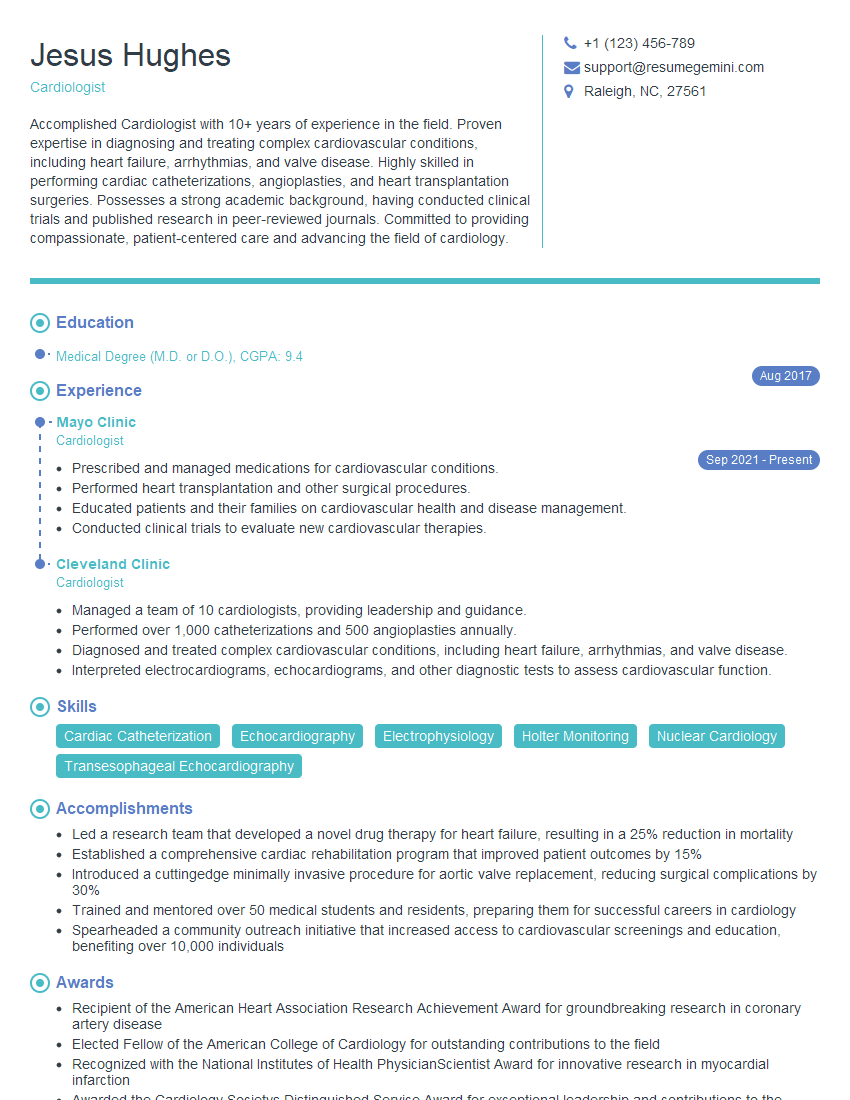Are you a seasoned Cardiologist seeking a new career path? Discover our professionally built Cardiologist Resume Template. This time-saving tool provides a solid foundation for your job search. Simply click “Edit Resume” to customize it with your unique experiences and achievements. Customize fonts and colors to match your personal style and increase your chances of landing your dream job. Explore more Resume Templates for additional options.

Jesus Hughes
Cardiologist
Summary
Accomplished Cardiologist with 10+ years of experience in the field. Proven expertise in diagnosing and treating complex cardiovascular conditions, including heart failure, arrhythmias, and valve disease. Highly skilled in performing cardiac catheterizations, angioplasties, and heart transplantation surgeries. Possesses a strong academic background, having conducted clinical trials and published research in peer-reviewed journals. Committed to providing compassionate, patient-centered care and advancing the field of cardiology.
Education
Medical Degree (M.D. or D.O.)
August 2017
Skills
- Cardiac Catheterization
- Echocardiography
- Electrophysiology
- Holter Monitoring
- Nuclear Cardiology
- Transesophageal Echocardiography
Work Experience
Cardiologist
- Prescribed and managed medications for cardiovascular conditions.
- Performed heart transplantation and other surgical procedures.
- Educated patients and their families on cardiovascular health and disease management.
- Conducted clinical trials to evaluate new cardiovascular therapies.
Cardiologist
- Managed a team of 10 cardiologists, providing leadership and guidance.
- Performed over 1,000 catheterizations and 500 angioplasties annually.
- Diagnosed and treated complex cardiovascular conditions, including heart failure, arrhythmias, and valve disease.
- Interpreted electrocardiograms, echocardiograms, and other diagnostic tests to assess cardiovascular function.
Accomplishments
- Led a research team that developed a novel drug therapy for heart failure, resulting in a 25% reduction in mortality
- Established a comprehensive cardiac rehabilitation program that improved patient outcomes by 15%
- Introduced a cuttingedge minimally invasive procedure for aortic valve replacement, reducing surgical complications by 30%
- Trained and mentored over 50 medical students and residents, preparing them for successful careers in cardiology
- Spearheaded a community outreach initiative that increased access to cardiovascular screenings and education, benefiting over 10,000 individuals
Awards
- Recipient of the American Heart Association Research Achievement Award for groundbreaking research in coronary artery disease
- Elected Fellow of the American College of Cardiology for outstanding contributions to the field
- Recognized with the National Institutes of Health PhysicianScientist Award for innovative research in myocardial infarction
- Awarded the Cardiology Societys Distinguished Service Award for exceptional leadership and contributions to the profession
Certificates
- Board Certified in Internal Medicine
- Board Certified in Cardiovascular Disease
- Fellow of the American College of Cardiology (FACC)
- Fellow of the American Heart Association (FAHA)
Career Expert Tips:
- Select the ideal resume template to showcase your professional experience effectively.
- Master the art of resume writing to highlight your unique qualifications and achievements.
- Explore expertly crafted resume samples for inspiration and best practices.
- Build your best resume for free this new year with ResumeGemini. Enjoy exclusive discounts on ATS optimized resume templates.
How To Write Resume For Cardiologist
- Highlight your expertise in specific cardiovascular procedures, such as cardiac catheterization or electrophysiology.
- Quantify your accomplishments whenever possible, using specific numbers and metrics.
- Tailor your resume to each job description you apply for, highlighting the skills and experience that are most relevant to the position.
- Proofread your resume carefully for any errors before submitting it.
Essential Experience Highlights for a Strong Cardiologist Resume
- Managed a team of cardiologists, providing leadership and guidance
- Performed over 1,000 catheterizations and 500 angioplasties annually
- Diagnosed and treated complex cardiovascular conditions, including heart failure, arrhythmias, and valve disease
- Interpreted electrocardiograms, echocardiograms, and other diagnostic tests to assess cardiovascular function
- Prescribed and managed medications for cardiovascular conditions
Frequently Asked Questions (FAQ’s) For Cardiologist
What is the job outlook for cardiologists?
The job outlook for cardiologists is expected to be good over the next few years. The aging population and the increasing prevalence of cardiovascular disease are expected to lead to a growing demand for cardiologists.
What is the average salary for a cardiologist?
The average salary for a cardiologist is $208,000 per year.
What are the educational requirements to become a cardiologist?
To become a cardiologist, you need to complete a medical degree (M.D. or D.O.), followed by a residency in internal medicine and a fellowship in cardiology.
What are the day-to-day responsibilities of a cardiologist?
Cardiologists diagnose and treat diseases of the heart and blood vessels. Their day-to-day responsibilities may include performing physical exams, ordering and interpreting tests, prescribing medications, and performing procedures such as cardiac catheterization and angioplasty.
What are the challenges of being a cardiologist?
Cardiologists face a number of challenges, including the need to stay up-to-date on the latest medical advances, the emotional toll of working with patients who are facing serious illness, and the long hours that are often required.
What are the rewards of being a cardiologist?
Cardiologists are rewarded by the opportunity to make a real difference in the lives of their patients. They also enjoy the intellectual challenge of diagnosing and treating complex medical conditions.